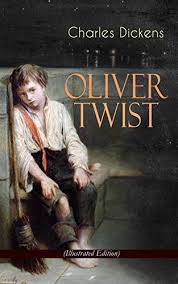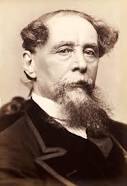Oliver Twist Page #13
Oliver Twist; or, the Parish Boy's Progress is Charles Dickens's second novel, and was published as a serial from 1837 to 1839 and released as a three-volume book in 1838, before the serialization ended. The story centres on orphan Oliver Twist, born in a workhouse and sold into apprenticeship with an undertaker.
'Ah, you'll get used to it in time, Oliver,' said Sowerberry. 'Nothing when you are used to it, my boy.' Oliver wondered, in his own mind, whether it had taken a very long time to get Mr. Sowerberry used to it. But he thought it better not to ask the question; and walked back to the shop: thinking over all he had seen and heard. CHAPTER VI OLIVER, BEING GOADED BY THE TAUNTS OF NOAH, ROUSES INTO ACTION, AND RATHER ASTONISHES HIM The month's trial over, Oliver was formally apprenticed. It was a nice sickly season just at this time. In commercial phrase, coffins were looking up; and, in the course of a few weeks, Oliver acquired a great deal of experience. The success of Mr. Sowerberry's ingenious speculation, exceeded even his most sanguine hopes. The oldest inhabitants recollected no period at which measles had been so prevalent, or so fatal to infant existence; and many were the mournful processions which little Oliver headed, in a hat-band reaching down to his knees, to the indescribable admiration and emotion of all the mothers in the town. As Oliver accompanied his master in most of his adult expeditions too, in order that he might acquire that equanimity of demeanour and full command of nerve which was essential to a finished undertaker, he had many opportunities of observing the beautiful resignation and fortitude with which some strong-minded people bear their trials and losses. For instance; when Sowerberry had an order for the burial of some rich old lady or gentleman, who was surrounded by a great number of nephews and nieces, who had been perfectly inconsolable during the previous illness, and whose grief had been wholly irrepressible even on the most public occasions, they would be as happy among themselves as need be--quite cheerful and contented--conversing together with as much freedom and gaiety, as if nothing whatever had happened to disturb them. Husbands, too, bore the loss of their wives with the most heroic calmness. Wives, again, put on weeds for their husbands, as if, so far from grieving in the garb of sorrow, they had made up their minds to render it as becoming and attractive as possible. It was observable, too, that ladies and gentlemen who were in passions of anguish during the ceremony of interment, recovered almost as soon as they reached home, and became quite composed before the tea-drinking was over. All this was very pleasant and improving to see; and Oliver beheld it with great admiration. That Oliver Twist was moved to resignation by the example of these good people, I cannot, although I am his biographer, undertake to affirm with any degree of confidence; but I can most distinctly say, that for many months he continued meekly to submit to the domination and ill-treatment of Noah Claypole: who used him far worse than before, now that his jealousy was roused by seeing the new boy promoted to the black stick and hatband, while he, the old one, remained stationary in the muffin-cap and leathers. Charlotte treated him ill, because Noah did; and Mrs. Sowerberry was his decided enemy, because Mr. Sowerberry was disposed to be his friend; so, between these three on one side, and a glut of funerals on the other, Oliver was not altogether as comfortable as the hungry pig was, when he was shut up, by mistake, in the grain department of a brewery. And now, I come to a very important passage in Oliver's history; for I have to record an act, slight and unimportant perhaps in appearance, but which indirectly produced a material change in all his future prospects and proceedings. One day, Oliver and Noah had descended into the kitchen at the usual dinner-hour, to banquet upon a small joint of mutton--a pound and a half of the worst end of the neck--when Charlotte being called out of the way, there ensued a brief interval of time, which Noah Claypole, being hungry and vicious, considered he could not possibly devote to a worthier purpose than aggravating and tantalising young Oliver Twist. Intent upon this innocent amusement, Noah put his feet on the table-cloth; and pulled Oliver's hair; and twitched his ears; and expressed his opinion that he was a 'sneak'; and furthermore announced his intention of coming to see him hanged, whenever that desirable event should take place; and entered upon various topics of petty annoyance, like a malicious and ill-conditioned charity-boy as he was. But, making Oliver cry, Noah attempted to be more facetious still; and in his attempt, did what many sometimes do to this day, when they want to be funny. He got rather personal. 'Work'us,' said Noah, 'how's your mother?' 'She's dead,' replied Oliver; 'don't you say anything about her to me!' Oliver's colour rose as he said this; he breathed quickly; and there was a curious working of the mouth and nostrils, which Mr. Claypole thought must be the immediate precursor of a violent fit of crying. Under this impression he returned to the charge. 'What did she die of, Work'us?' said Noah. 'Of a broken heart, some of our old nurses told me,' replied Oliver: more as if he were talking to himself, than answering Noah. 'I think I know what it must be to die of that!' 'Tol de rol lol lol, right fol lairy, Work'us,' said Noah, as a tear rolled down Oliver's cheek. 'What's set you a snivelling now?' 'Not you,' replied Oliver, sharply. 'There; that's enough. Don't say anything more to me about her; you'd better not!' 'Better not!' exclaimed Noah. 'Well! Better not! Work'us, don't be impudent. Your mother, too! She was a nice 'un she was. Oh, Lor!' And here, Noah nodded his head expressively; and curled up as much of his small red nose as muscular action could collect together, for the occasion. 'Yer know, Work'us,' continued Noah, emboldened by Oliver's silence, and speaking in a jeering tone of affected pity: of all tones the most annoying: 'Yer know, Work'us, it can't be helped now; and of course yer couldn't help it then; and I am very sorry for it; and I'm sure we all are, and pity yer very much. But yer must know, Work'us, yer mother was a regular right-down bad 'un.' 'What did you say?' inquired Oliver, looking up very quickly. 'A regular right-down bad 'un, Work'us,' replied Noah, coolly. 'And it's a great deal better, Work'us, that she died when she did, or else she'd have been hard labouring in Bridewell, or transported, or hung; which is more likely than either, isn't it?' Crimson with fury, Oliver started up; overthrew the chair and table; seized Noah by the throat; shook him, in the violence of his rage, till his teeth chattered in his head; and collecting his whole force into one heavy blow, felled him to the ground. A minute ago, the boy had looked the quiet child, mild, dejected creature that harsh treatment had made him. But his spirit was roused at last; the cruel insult to his dead mother had set his blood on fire. His breast heaved; his attitude was erect; his eye bright and vivid; his whole person changed, as he stood glaring over the cowardly tormentor who now lay crouching at his feet; and defied him with an energy he had never known before.
Translation
Translate and read this book in other languages:
Select another language:
- - Select -
- 简体中文 (Chinese - Simplified)
- 繁體中文 (Chinese - Traditional)
- Español (Spanish)
- Esperanto (Esperanto)
- 日本語 (Japanese)
- Português (Portuguese)
- Deutsch (German)
- العربية (Arabic)
- Français (French)
- Русский (Russian)
- ಕನ್ನಡ (Kannada)
- 한국어 (Korean)
- עברית (Hebrew)
- Gaeilge (Irish)
- Українська (Ukrainian)
- اردو (Urdu)
- Magyar (Hungarian)
- मानक हिन्दी (Hindi)
- Indonesia (Indonesian)
- Italiano (Italian)
- தமிழ் (Tamil)
- Türkçe (Turkish)
- తెలుగు (Telugu)
- ภาษาไทย (Thai)
- Tiếng Việt (Vietnamese)
- Čeština (Czech)
- Polski (Polish)
- Bahasa Indonesia (Indonesian)
- Românește (Romanian)
- Nederlands (Dutch)
- Ελληνικά (Greek)
- Latinum (Latin)
- Svenska (Swedish)
- Dansk (Danish)
- Suomi (Finnish)
- فارسی (Persian)
- ייִדיש (Yiddish)
- հայերեն (Armenian)
- Norsk (Norwegian)
- English (English)
Citation
Use the citation below to add this book to your bibliography:
Style:MLAChicagoAPA
"Oliver Twist Books." Literature.com. STANDS4 LLC, 2025. Web. 10 Jan. 2025. <https://www.literature.com/book/oliver_twist_331>.




Discuss this Oliver Twist book with the community:
Report Comment
We're doing our best to make sure our content is useful, accurate and safe.
If by any chance you spot an inappropriate comment while navigating through our website please use this form to let us know, and we'll take care of it shortly.
Attachment
You need to be logged in to favorite.
Log In